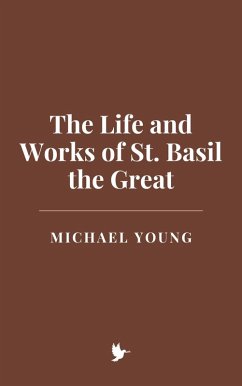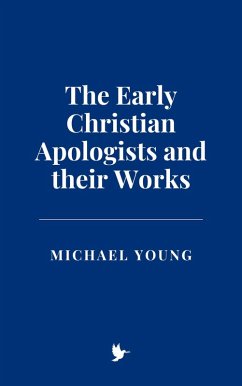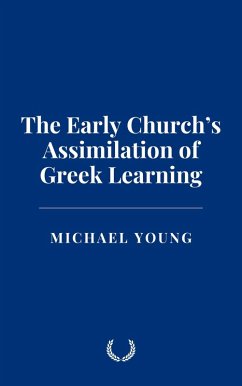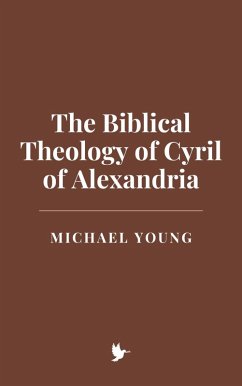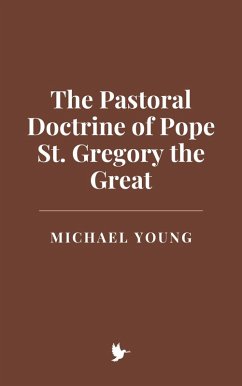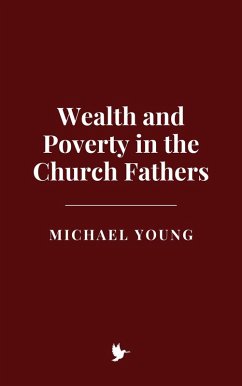
Liturgy, Monasticism and Theology in St. Basil the Great (eBook, ePUB)

PAYBACK Punkte
0 °P sammeln!
The life and work of St. Basil the Great represent one of the most significant contributions to Christian theology, monasticism, and liturgical practice during the pivotal fourth century. As one of the Cappadocian Fathers, alongside Gregory of Nyssa and Gregory of Nazianzus, Basil's theological vision was forged within a dynamic period shaped by doctrinal disputes, imperial interventions, and evolving Christian expressions of community life. Born around 330 AD in Caesarea of Cappadocia, Basil belonged to a distinguished Christian family that included saints such as his grandmother Macrina the ...
The life and work of St. Basil the Great represent one of the most significant contributions to Christian theology, monasticism, and liturgical practice during the pivotal fourth century. As one of the Cappadocian Fathers, alongside Gregory of Nyssa and Gregory of Nazianzus, Basil's theological vision was forged within a dynamic period shaped by doctrinal disputes, imperial interventions, and evolving Christian expressions of community life. Born around 330 AD in Caesarea of Cappadocia, Basil belonged to a distinguished Christian family that included saints such as his grandmother Macrina the Elder, his sister Macrina the Younger, and his brother Gregory of Nyssa. These familial influences instilled in Basil a profound sense of faith and intellectual curiosity, inspiring a lifetime of service to the Church through ascetic rigor, theological brilliance, and pastoral reform.
Basil's theological contributions cannot be understood apart from the context of his era. The Nicene Creed, formulated in 325 AD, had not yet secured universal acceptance among Christians, and Arianism-espousing that Christ was not of the same substance as the Father-persisted as a divisive force. Basil entered the fray at a time when emperors and bishops were often entangled in political and theological power struggles. His defense of the consubstantiality of the Holy Trinity established him as a leading voice against heresy, contributing to the Church's Trinitarian orthodoxy through his theological writings, particularly On the Holy Spirit. In this seminal work, Basil articulated the equality of the Spirit with the Father and the Son, grounding his argument in Scripture and tradition while responding to critics with rhetorical precision and pastoral sensitivity.
However, Basil's legacy extends far beyond his doctrinal defenses. His vision of Christian life as one shaped by communal prayer, ascetic discipline, and service to others was profoundly innovative. Dissatisfied with the isolated eremitic model of asceticism prevalent among the Egyptian desert fathers, Basil sought to establish a form of monasticism that integrated solitude and community. His travels to monastic settlements in Egypt, Palestine, and Syria in the early 350s profoundly influenced his understanding of monastic discipline, yet he adapted these influences to the specific needs of the Cappadocian context. For Basil, monasticism was not an escape from the world but a microcosm of the Church's mission-a community where believers lived out the Gospel in charity, humility, and worship.
Basil's theological contributions cannot be understood apart from the context of his era. The Nicene Creed, formulated in 325 AD, had not yet secured universal acceptance among Christians, and Arianism-espousing that Christ was not of the same substance as the Father-persisted as a divisive force. Basil entered the fray at a time when emperors and bishops were often entangled in political and theological power struggles. His defense of the consubstantiality of the Holy Trinity established him as a leading voice against heresy, contributing to the Church's Trinitarian orthodoxy through his theological writings, particularly On the Holy Spirit. In this seminal work, Basil articulated the equality of the Spirit with the Father and the Son, grounding his argument in Scripture and tradition while responding to critics with rhetorical precision and pastoral sensitivity.
However, Basil's legacy extends far beyond his doctrinal defenses. His vision of Christian life as one shaped by communal prayer, ascetic discipline, and service to others was profoundly innovative. Dissatisfied with the isolated eremitic model of asceticism prevalent among the Egyptian desert fathers, Basil sought to establish a form of monasticism that integrated solitude and community. His travels to monastic settlements in Egypt, Palestine, and Syria in the early 350s profoundly influenced his understanding of monastic discipline, yet he adapted these influences to the specific needs of the Cappadocian context. For Basil, monasticism was not an escape from the world but a microcosm of the Church's mission-a community where believers lived out the Gospel in charity, humility, and worship.
Dieser Download kann aus rechtlichen Gründen nur mit Rechnungsadresse in A, B, CY, CZ, D, DK, EW, E, FIN, F, GR, H, IRL, I, LT, L, LR, M, NL, PL, P, R, S, SLO, SK ausgeliefert werden.




